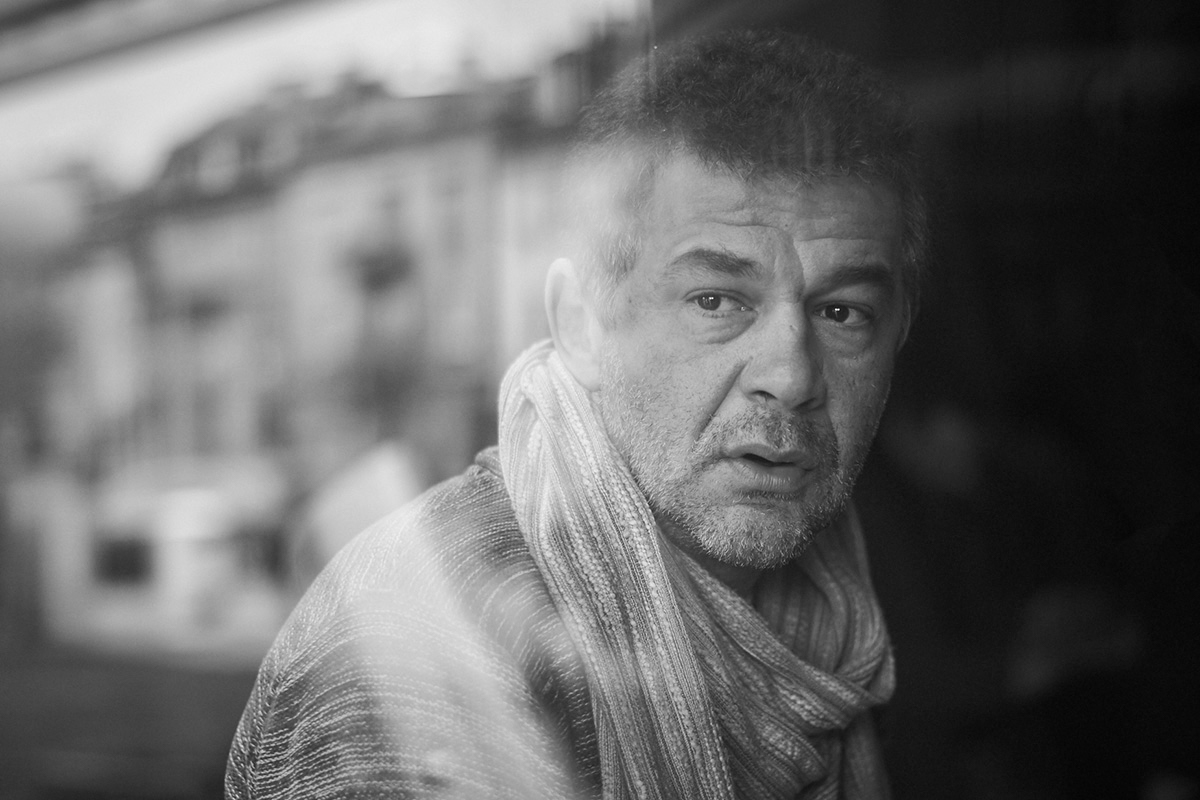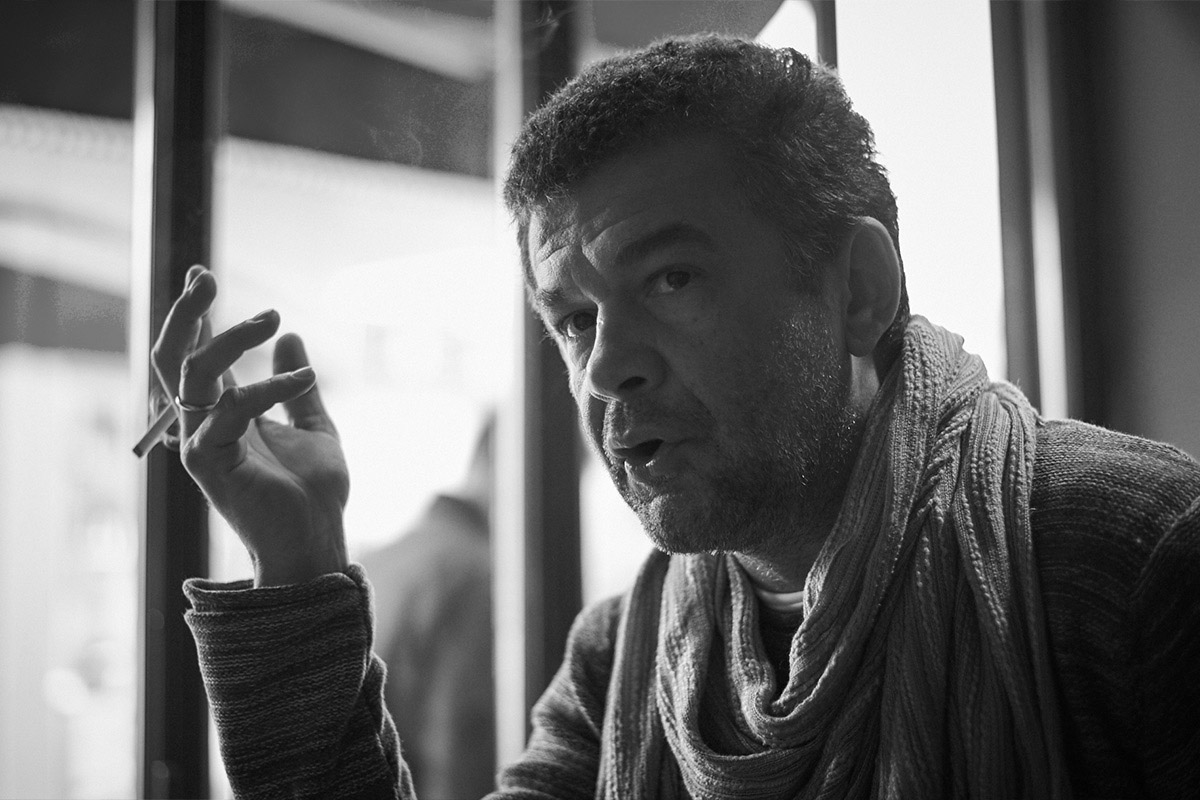Nebojsa Glogovac: Dorcol local from Trebinje
Nebojsa Glogovac, the self-made legend of Serbian acting, unlikely psychologist from Trebinje by birth doesn’t fail to impress with any role he takes. He spent his childhood in Pancevo and became a Belgrader from Dorcol thanks to acting.
What was Belgrade like in the 90s when you were a growing lad who just began to gain real life and acting experience?
I came to Belgrade because I enlisted in the acting academy. The classes back then were organized in such a way that you spend the entire time between 8AM and 8PM at the academy. In that way I didn’t get to experience Belgrade live much back then. Maybe here and there, if we went out after class for a party or something. We were all so engrossed in the academy and happy that we managed to enlist, that it was the main priority in all our lives. My class consisted entirely of people from the provinces – nobody was from Belgrade. This was the plan of our late professor Vlada Jeftovic, to assemble a class of people from outside the city because he felt that they would claw and fight more for what they wanted. So, we were all united and stuck together. In that bout of youth everything seemed great. Still, if you looked at things from a bit of a distance, you’d see that terrible things were beginning to brew. Suddenly I started seeing some dead people in front pages. I had never seen a dead person even in a picture before that. I remember vividly those images in newspapers of people wounded or murdered – a serious indicator of the grave problems that would happen. We spent one part of our academy days by going to protests, sleeping on the stairs of Moscow hotel. It turned out to all be a big game of sorts, but it was our slice of the revolution.
After that the year 2000 came. People felt that the city itself had begun to ‘breathe’. Did you have that impression too?
It was the hope that came when Milosevic went to Hague. Everything seemed like a victory and this is where that positive feeling had come from. Of course, it turned out to stem from inexperience. This was all something new that stemmed from the revolutionary movement that seemed to succeed. It all turned out to be a game in itself and the people weren’t much better off.

You live in Dorcol. Is that your favorite part of the city?
I live in Strahinjica Bana street, in a rented apartment, but I would never live in the center of the city. The wife and I were specifically looking for a place away from the heart of the city. I’ve been bound to Dorcol for the past 20 years due to certain circumstances but also because I love it and because it’s right there across the bridge when you arrive from Pancevo. I like the looks and the atmosphere of this area. I lived in Gundulicev venac, then briefly in Bezanijska kosa. I purchased my first apartment in Belgrade in Gundulicev venac, then went to Cara Dusana street and now finally I’m in Strahinjica Bana. This was how I stayed in a circle of about 1km most of my life. This is where my favorite cafe is where I have a cup of coffee almost every day, my favorite bakery...still, even though everything is nearby, recently I’ve felt that I miss peace and quiet so I’d like to move from the center of the city.
You mentioned that all people in your class at the academy came from outside Belgrade. Belgrade has a reputation of being a welcoming city which accepts everyone. Has this been your experience?
That type of definition for the mentality of a city is ill-informed. There was a time when you could define Belgrade, but that is no longer the case. I feel that it has lost a lot of its charm, humor, elegance. A lot has been watered down by some new standards, tastes, aesthetics. Belgrade is a victim of politics and the narrative that the politics respect, appreciate and promote. All this has, in my opinion, resulted in a sort of tasteless lack of charm.
You have three children. As a parent have you found it easier to raise your children in Belgrade or in a more enclosed environment like Pancevo or Trebinje?
Large cities are still split up into several smaller ones. It’s hard to say I’m from Belgrade. I think it’s more realistic to say I am from Zemun, Dorcol, Palilula...Belgrade is a broad term and different neighborhoods can be very unlike each other. In every whole there are specific customs and mannerisms. Belgrade, as a sum of these neighborhoods is a bit of a challenge. You need to be strongly mentally and spiritually oriented in order to not lose yourself and begin conquering Belgrade without losing track among the many challenges it presents. It’s like shopping in a huge supermarket. When you’re hungry, you’re buying even things you don’t need because it’s all right there. In a smaller store you’ll buy bread, milk and a few things that you need because everything is right there. The huge amount of options is what, in my opinion, ends up being a problem for people. In smaller environments people know each other very well, you know each others’ parents, children. Even if you’re not from there, it doesn’t take long to get to know everyone. A certain kind of behavior, opinions and morals is made through that “we know each other” mentality which is good for forming one’s personality. You can’t make an indiscretion and then just move on to a different crowd and you’re fine. In Belgrade, sadly, that’s more than possible – you can fake it for a long time.

How did acting become your calling?
It drew me in. The late Milenko Zablacanski talked me into it. It wasn’t that important to me to enlist in the academy and spend my whole life in this field. I liked working in amateur theatre. First I enlisted in psychology and spend two years studying it, however as we performed in the amateur theatre in Pancevo Milenko snatched me up and talked me into taking the entrance exam in the academy. It was like I was being guided without even realizing it.
You have a reputation as an actor who prepares very thoroughly. How do you get into your roles?
There are several ways you can do that. One is to take a few millions for one movie and then be financially sound as you prepare for the next one. Then, as Jeremy Irons, if you’re preparing for the role of a clock-maker, you’ll pick up that trade and live that life for a while. With us however this goes from month to month and those things function based on previous knowledge and experience. I do my best to get into the role mentally because I can’t live my family life if I am also living the life of a character. I tend to contemplate my roles during my alone hours and mull over what and how I can do. That type of thing thrills me.
There’s an urban legend that says that you prepared for your role in Huddersfield by visiting mental illness institutions. Is this true?
Of course not. I just talked to a friend of mine who is a pharmacist about how that type of medication works. What I learned I combined with the text itself and that is how Ivan’s role came to be.
What’s your opinion on TV series and how do you see roles in them?
TV series have become a serious form of expression. Every episode is like a brilliant movie. I won’t forget Breaking bad and how hypnotizing it was and how it pulls you in for the rest of my life. It was something I had never experienced before. High quality series are being made more and more with a lot of attention and with seriously impressive budgets. They are much more than what sitcoms used to be.

The plot of the movie “Krugovi” (Circles) takes place in your home town Trebinje and was based on true events. Was it difficult for you to play in this movie? People from Trebinje don’t like to comment on this film.
We have made a movie based on an event that had an impact related to time and other events on this form of dramaturgy. What was the biography of Srdjan Aleksic, his father and mother was something we didn’t go into. People of Trebinje of course know that much better. The movie isn’t about that, but about the dramaturgy of the events.
Some media stated that the role of a nationalist homosexual that you play in the movie “Ustav republike Hrvatske” was allegedly rejected by a large number of actors. Is there any truth to that?
This is completely incorrect. The casting lasted for about a year and a half and involved a huge number of actors who all competed for that role. It was considered to be a beautiful acting challenge, a treat for anyone who loves this type of work. It was a role of the highest caliber in a great movie with a great script. In the Raindance festival in London which has a history of over 25 year, this movie was the first ever to get the award for the leading male role, best script and best movie, which were the three main awards.
How important are the awards to you? How satisfying is it to get one?
Those who work for awards often don’t get them and even end up failing with their movies. Awards aren’t a motivation to me, but a consequence of a job well done.
Finally can you tell us what you think of our portal’s new look at 011info.com?
The portal looks great. It’s much easier to access the information and it aesthetically keeps up with the times which I believe will help more people looking for information about Belgrade.




 13 ℃
13 ℃





